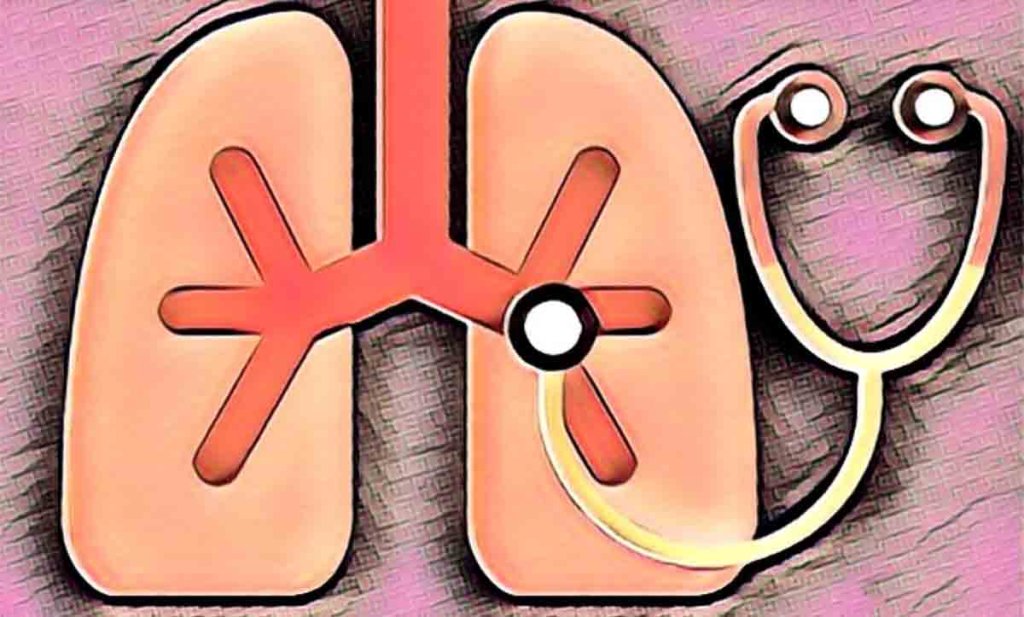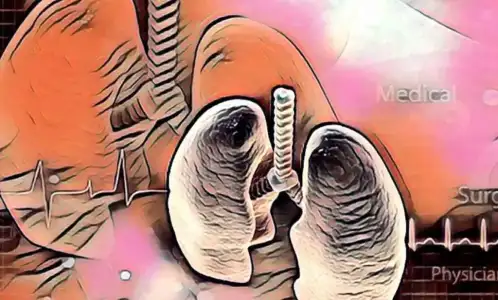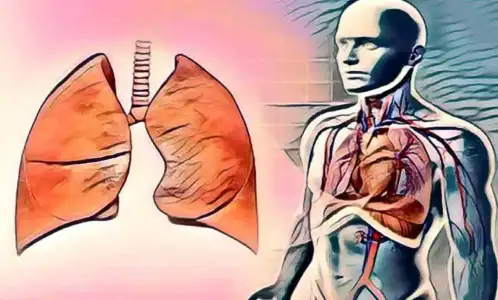How Does Rheumatoid Arthritis Affect the Lungs?

Rheumatoid arthritis is an autoimmune disease and is often characterized by pain, swelling and stiffness in the joints. However, rheumatoid arthritis can also affect other parts of the body, including the lungs.
The effects of rheumatoid arthritis on the lungs can take various forms. The most common is that rheumatoid arthritis causes lung tissue. This is a condition known as interstitial lung disease and can cause inflammation, scarring, and fibrosis of tissues in the lungs. This can impair lung function and cause difficulty in breathing.
Rheumatoid arthritis can also affect the blood vessels in the lungs. This condition is known as pulmonary arterial hypertension and can affect blood flow to the lungs due to narrowing or blockage of blood vessels. This can lead to lung failure, heart failure, and even death.
Also, another rare complication of rheumatoid arthritis is the formation of nodules in the lungs. These nodules are small bumps of tissue in the lungs and can cause difficulty in breathing.
As a result, rheumatoid arthritis can cause significant complications not only in the joints but also in the lungs. For this reason, it is valuable for individuals with rheumatoid arthritis to visit their physician regularly, monitor their lung health, and receive appropriate treatments to prevent complications.
In addition to damaging the joints, rheumatoid arthritis can also affect your lungs, so it is valuable to consult your physician and take precautions. One of the most important complications is interstitial lung disease, which can be difficult to detect. Rheumatoid arthritis (RA) doesn’t just affect your joints. It can also damage the tissue surrounding the joints, as well as your eyes, heart, and most importantly, your lungs.
Pulmonary complications caused by rheumatoid arthritis can be significant and even cause death.
If you have rheumatoid arthritis, don’t wait to protect your lungs and airways. Research published in the European Inhalation Review shows that damage to the pleura or pleura can occur in up to 70 percent of all people with RA, but only 3 to 5 percent experience symptoms. According to the Arthritis Foundation, almost 10 percent of people living with RA will develop interstitial lung disease (ILD) or scarring of their lung tissue.
Interstitial Lung Disease: What Is It, How Does It Relate To RA?
Interstitial lung disease associated with rheumatoid arthritis, or RA-ILD, is one of the most important pulmonary complications for individuals with rheumatoid arthritis. Detecting this disease can be a nuisance, but it occurs when lung tissue becomes inflamed and eventually injured. A French study, presented in summary at the American College of Rheumatology (ACR) annual conference in November 2020, found the prevalence of subclinical (asymptomatic) ILD to be 18.2 percent after an average of 13 years of RA. This suggests that the development of ILD with RA is not a minor event.
Lung problems associated with RA can be fatal. Another study, presented at ACR 2020 from Brigham and Women’s Hospital, suggests a strong link of RA-ILD with multiple mortality, particularly respiratory and cancer mortality, says lead author Jeffrey A. Sparks, professor of medicine in Boston and She specializes in rheumatology, inflammation and immunity bets at Women’s Hospital and Harvard Medical School.
Risk Factors for Rheumatoid Arthritis Lung Issues
Not much is known about the rheumatoid arthritis mid-lung junction, but recent research has identified new risk factors:
- Being Male: Although more women than men get RA, men are at higher risk than women of developing RA-ILD, according to the Arthritis Foundation. Dr. “We need more research to find out why this is the case,” says Sparks. “It may be genetic, or there may be a tendency for males to have a more aggressive severity of RA.”
- Long Term Smoking Story: The Brigham and Women’s Hospital Sequential Study of Rheumatoid Arthritis (BRASS) presented a summary at the ACR conference that found smoking above a 30-pack-year threshold (e.g., one pack or 2 packs per day for 30 years). daily packs for 15 years) are strongly associated with RA-ILD.
- Genetic: In another abstract presented at the conference, a gene variant called the MUC5B promoter variant was shown to be associated with an increased risk of ILD in RA patients. However, a different ACR 2020 summary reported that this variant was “not associated with progression of RA-ILD at the 10-year follow-up deadline.” The research is out of place for clinical use now, but it could be used in the future to help assert risk.
- Obesity:“We found that obese patients have more than twice the risk of future ILD,” says Sparks.
Rheumatoid Arthritis Lung Signs and Symptoms
(RA) lung (ILD) can cause shortness of breath and a dry cough, but in more than one case it causes no symptoms and makes early diagnosis difficult.
Medication and Treatment for RA-ILD
A number of other drugs are used to treat RA-ILD, such as mycophenolate mofetil, azathioprine (Azasan, Imuran), cyclosporine (Gengraf, Neoral), and cyclophosphamide (Cytoxan). A new class of drugs called antifibrotics (pirfenidone and nintedanib) is used in people with other fibrotic lung diseases or diseases that include scarring or damage to the lung. Research is ongoing to determine whether these drugs should be used in patients with RA-ILD.
Risk of Developing Pulmonary Fibrosis
Inflammation, such as that caused by RA-ILD, can lead to pulmonary fibrosis or permanent scarring of respiratory tissues. This can cause shortness of breath, as healthy air sacs are replaced by scar tissue that does not work properly. Supplemental oxygen may facilitate breathing, but does not reverse the damage done by pulmonary fibrosis.
Nodules May Form in the Throat, Vocal Cords, and Lungs
Rheumatoid arthritis can also cause nodules to form in the throat and vocal cords, causing complications such as hoarseness, shortness of breath, and other changes. Nodules can also develop in the lungs, but often do not cause symptoms and patients may never notice them.
Few Other Lung Complications May Occur
People living with rheumatoid arthritis also face a higher risk of:
- Bronchiectasis or damage to the airways
- Bronchiolitis obliterans, or inflammation of the small bronchial tubes
- Pleural effusion, fluid accumulation in the middle of the lung and chest wall
- Pleurisy or pleuritis or inflammation of the lining of the lung and chest wall
- Pulmonary hypertension, high blood pressure in the lungs
- Take Action Quickly to Protect Lung Tissue Long-Term
- rheumatoid arthritis shortness of breath
Don’t expect experts to understand the “why” behind RA-related lung issues. Equip your watcher action plan now with these eight tips:
Get Early Treatment for RA
We are still trying to understand the natural history of lung involvement in RA and how exactly the drug might be involved. At this point, I encourage early screening for lung involvement for patients with signs and symptoms,” says Sparks. If you have RA and experience shortness of breath, cough, or other respiratory symptoms, talk to your doctor. These are potentially important symptoms that require immediate attention. “
Do Not Smoke and Avoid Passive Smoking
Smoke is more prone to developing interstitial lung diseases. Quit smoking, get help to quit. Hello 171 Smoking Cessation Counseling Line
Limit Exposure to Airborne Chemicals and Air Pollution
There seems to be a tight connection between the lungs and joints in RA, so it is invaluable to eliminate as much inhaled matter as possible, such as pesticides, airborne chemicals, and air pollution. The research focused on the detrimental effects of many cigarettes on both the joints and lungs, but it makes sense that gluttons are probably unhealthy, too, Sparks said.
Ask Your Doctor About Flu and Pneumonia Vaccines
Have you had the flu shot this year? Have you discussed the Pheumonia vaccine with your doctor? Preventing infection is better than curing the infection, as damage can occur to the lungs. “Influenza and pneumonia vaccines are effective and are strongly recommended to all patients with RA, especially if they are on immunosuppressive medication, making both of these vaccines more susceptible to infection,” Sparks said. It can become more severe if it becomes infected. “
Activate Your Body!
Training for lung health in RA has not been extensively studied now, but systems training provides health benefits for your entire system.
Be Aware of Possible RA Medication Risks and Side Effects
Some RA medications are immunosuppressive and can cause infections in the lungs. No one really knows how RA treatment affects the lungs, either positively or negatively. “Patients are encouraged to talk to their healthcare professionals to make sure medications are optimal for their joint symptoms and lung health,” Sparks says.
If You Have Shortness of Breath or Dry Cough, Tell Your Physician Quickly
Persistent cough can be caused by any of the aforementioned lung diseases and conditions. If you let it go and it turns out to be caused by an infection, the infection will get worse.
- On-Site Comments

















Comment